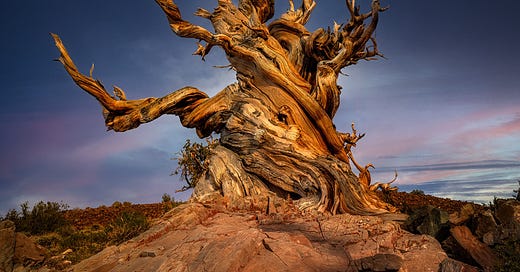They’ve witnessed a hundred generations be born and die. Breathed in the smoke of our wars, recycled our blood through their sap. Still, except for the slow and steady creep up towards the sun, reaching for light, and down, reaching for water, for earth. Silent except for when the wind blows their branches rubbing, the faint whisper of a needle falling.
The bristlecone are our oldest trees, and some of the toughest, too. They thrive in high mountainscapes, places where the cold and the wind harden the earth, where lightning storms seek their twisted trunks. The oldest of the ancients are the scrappiest, knobbled little mostly-dead elders, their fire-scarred roots wedged between boulders, thin strips of bark crawling up dead wood towards a cone or two, raggedy clusters of needles. They live until their heartwood is finally taken by a wayward bolt, persistent, patient fungus.
When I turned thirty years old, I made a pilgrimage to the White Mountains, to sit with the elders there. It wasn’t planned. The plan had been to onsight freesolo a climb on Yosemite’s Half Dome. This was back in the able-bodied days, the lonely days, days of wild adventure and untouchable pain. I sought the edge of life to feel my desire to stay on this side of it. A new decade dawned, and I ached to become something new, to find my power, to return to the earth. My body exploded with life, while my spirit, completely exhausted, sought a cool dark rest.
I stopped for a sport climbing session on the way to the Valley, and injured my hand. Climbing was out of the picture. In a frustrated inward rage, I kept driving West, my ’98 Toyota Tercel creaking and whining along empty highways. I needed the council of the mountains. And so I found myself winding into the Whites, the snow and the ice, the home of the bristlecones.
On my birthday, there was rockfall on the route I had planned to climb. A giant slab sloughed off the cliff. Two climbers died.
Beneath the bristlecones, I swigged a bottle of Wandering Poet saké, and watched the stars overtake the sky. The trees held me in their knobby roots. They drank my tears and turned them into air for me to breathe, to keep living. The smell of the earth in those high hills is exquisite, herbal and clear, sharp and mineral. I wonder how it smelled a hundred years ago, before I was born. Two thousand, when this tree was half its size, gazing out over plains of buffalo, over a land that Europeans had yet to cover in roads and cows and rows of grains and their creeping settlements.
I don’t know what this tree knows of heartbreak, but I know that the sky has struck it with fire and burnt away half its body. I know that in its lifetime it will seed a million baby trees, and only one or maybe two will survive their youth. I know that years will go by when it will have only a few brief rains, and it will lose branches to the drought, while around it, its children die. Its children, who can only be born of fire, the same fire that may cleanse it of pests at the cost of its branches. The same fire that may come back tomorrow, and take its life.
I know that the bristlecone’s existence is thick in what we’d call tragedy and yet it lives on, and on, and on, and it takes no vengeance. Its blood flows through the coldest winter. I could poison the land around it, sell it off to be logged and mined, and until the day I chop that tree down it would still be there to hold me steady in its ancient embrace. Branches black and grey, wind-twisted, little strip of life, it looks perfectly at peace framing the infinite spread of the universe beyond. And in its embrace, breathing with it, for it, learning how to give and receive, learning stillness, learning, finally, forgiveness . . . so am I. So am I.








